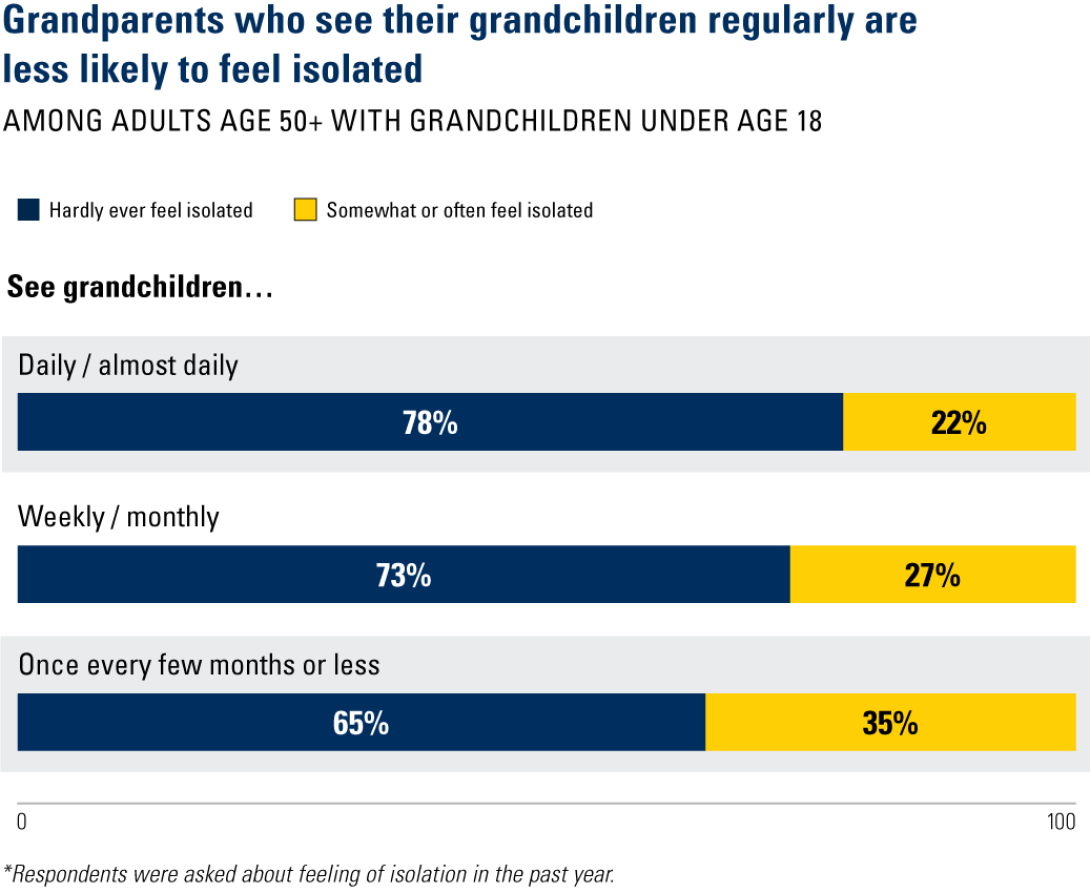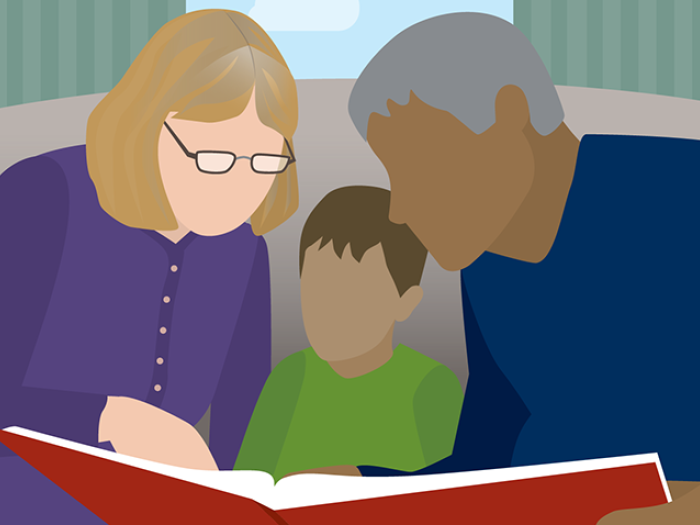Less loneliness and better mental health seen among those who see or care for grandchildren often
8:00 AM
Author |

As many Americans prepare to gather with their families for the holidays, a poll shows the importance of grandchildren in grandparents’ lives.
The poll also suggests that having grandchildren and seeing them regularly may have a link to older adults’ mental health and risk of loneliness.
Although the poll can’t show cause and effect, the findings suggest a need to study the role of grandparenting in older adults’ lives, as part of a broader effort to address social isolation.
At the same time, the poll found that many grandparents support their grandchildren under 18 in some way, from covering major expenses to providing childcare or babysitting regularly, or even daily.
The data come from the National Poll on Healthy Aging, based at the University of Michigan’s Institute for Healthcare Policy and Innovation.
The poll is supported by AARP and Michigan Medicine, U-M’s academic medical center.
In all, the poll shows, 60% of adults aged 50 and over have at least one grandchild, including step-grandchildren, adopted grandchildren and great grandchildren.
That includes the 27% who said they have five or more grandchildren.
Those over age 65 were much more likely than those in their 50s and early 60s to say they have one or more grandchildren, at 76% versus 46%.
People with at least one grandchild were more likely than those without grandchildren to say they hardly ever feel isolated.
People without grandchildren were also more likely to say their mental health is fair or poor compared with those who have grandchildren (13% versus 9%.)
“For many older people, becoming a grandparent is a major milestone in their lives. Our findings show there are many dimensions to grandparenting, and possible positive effects of grandparenting, some of which may not be widely recognized,” said Kate Bauer, Ph.D., an associate professor of nutritional sciences in the U-M School of Public Health who worked with the poll team.
“With growing attention by policymakers to the role of social interaction in the well-being of people over age 50, and also the struggles of older adults who are raising children under 18, we hope our findings will inform those policy discussions,” said Bauer.
Poll director Jeffrey Kullgren, M.D., M.P.H., M.S., an associate professor of internal medicine at U-M and a physician at the VA Ann Arbor Healthcare System, said, “Health care providers should consider asking their older patients whether they are active in their grandchildren’s lives, and perhaps encourage more involvement among those who are struggling with loneliness or depression, even if they live far apart and need to connect virtually when they can’t be together.”
Caring for children
Nearly half (49%) of those who have grandchildren under age 18 provide care for them at least once every few months.
In all, 20% of those with grandchildren under 18 care for one or more grandchild at least once a week, with 8% providing daily or near-daily care.
Ten percent of grandparents who are age 50 to 64 reported providing daily or near-daily care, compared with 6% of those age 65 and over.
Older adults who identified as Hispanic were more likely to say they take care of a grandchild under 18 every day or nearly so, at 15% compared with 7% of non-Hispanic white, and 9% of non-Hispanic Black older adults who have grandchildren under age 18.
With the high cost and limited availability of childcare in the United States, grandparents who provide regular care for their grandchildren are giving their families a valuable resource, Bauer notes.
Seeing grandchildren
The poll asked older adults who have grandchildren under age 18 how often they see them.
In all, 18% of grandparents see their grandchild or grandchildren every day or nearly every day, an additional 23% see them at least once a week and 23% see them once or twice a month, while 36% said they only see them every few months or less.
In general, grandparents who see their grandkids more often were less likely to say they feel isolated.
Overall, 78% of those who see grandchildren under 18 every day or nearly every day said they hardly ever feel isolated, compared with 65% of those who see their grandchildren every few months or less.

Also, 73% of those who see their grandchildren at least weekly or once or twice a month said they hardly ever feel isolated.
There was a similar trend when the poll team looked at those who reported hardly ever feeling a lack of companionship.
In all, 57% of grandparents who see their grandchildren only every few months reported feeling this way, compared with around 70% of those who see them more frequently.
Those grandparents who see their grandchildren only every few months or less were more likely to say their mental health is fair or poor (13%) compared with those who see them at least once a week (4%) or once or twice a month (8%).
There was no difference for physical health status.
Eating with or cooking with grandchildren
Bauer’s research focuses on social factors related to children’s eating behaviors and weight.
The poll asked older adults who have grandchildren ages 1 to 17 whether they had engaged in food-related activities with their grandchildren in the past month.
In all, 61% of these older adults said they had shared at least one meal with a grandchild or grandchildren in the past month, and 47% said they had prepared food for them, while an equal percentage said they had bought food for their grandchildren.
And a sizable percentage – 36% – said they had baked or cooked with their grandchildren in the past month.
“Eating, and especially cooking, with grandchildren can be an opportunity for older adults to make important social and cultural connections, such as passing down knowledge and recipes,” said Bauer.
“Given how many grandparents are frequently engaging with their grandchildren around food and eating, it is important that they relay positive and healthy messages about nutrition and body size.”
Paying for grandchildren’s expenses
Overall, nearly one-third (32%) of older adults who have grandchildren under age 18 say they have helped provide financial support to them in some way in the past year.
Health care providers should consider asking their older patients whether they are active in their grandchildren’s lives, and perhaps encourage more involvement among those who are struggling with loneliness or depression."
-Jeffrey Kullgren, M.D., M.P.H., M.S.
This includes 23% who helped with day-to-day expenses such as clothes, meals and groceries; 10% who paid for educational expenses; and 10% who provided support for other big expenses such as summer camps, sports and daycare.
Living with grandchildren
Among all adults aged 50 and older who have grandchildren, 6% live in the same home as at least one of their grandchildren.
This percentage was higher among Black older adults (9%) and Hispanic older adults (9%) compared with white older adults (5%), and among older adults in their 50s and early 60s (8%) compared with those over age 65 (4%.)
Also, among those who have grandchildren, 3% said they have primary custody or primary parental responsibility of a grandchild aged 17 or younger.
The percentage was higher (6%) among grandparents who are age 50 to 64, compared to those age 65 and older (1%).
Bauer notes the grandparents who take on full-time roles caring for grandchildren – forming what are sometimes called “grandfamilies” – can play a critical role in providing stability during challenging times in children’s lives.
More research is needed on their role.
Michigan findings
Thanks to funding from the Michigan Health Endowment Fund, the poll team also looked at grandparenting among 1,174 Michiganders aged 50 and over.
In all, 63% of Michiganders in this age group have at least one grandchild, including 51% of those in their 50s and early 60s and 74% of those age 65 and over.
Older adults living in northern, central and southwestern Michigan were more likely to be grandparents than those in the southeastern part of the state.
When it came to providing daily or nearly daily care for grandchildren under age 18, Michiganders reported doing so at about the same percentages as those in the rest of the country.
But 25% of older Black Michiganders said they provide daily or near-daily care to a grandchild or grandchildren, higher than the national percentage, while the rate of daily or near-daily grandchild care among white Michiganders was around 6%, similar to the national figure.
In addition, 30% of Black Michigan grandparents said they see their grandchildren every day or nearly every day compared with 15% of white Michigan grandparents.
Also, older Michigan women were more likely to say they see their grandchildren every day or nearly every day compared with men (21% versus 11%.)
Grandparents living in the southeastern region were more likely to be part of ‘grandfamilies’ by having custody of at least one grandchild, with 5% saying they do, compared with 3% or less elsewhere in the state.
The poll findings come from a nationally representative survey conducted by NORC at the University of Chicago for IHPI and administered online and via phone in August 2024 among 3,486 adults ages 50 - 94 across the U.S.
The Michigan sample included 1,174 respondents ages 50-94. The samples were subsequently weighted to reflect the U.S. and Michigan populations.
Sign up for Health Lab newsletters today. Get medical tips from top experts and learn about new scientific discoveries every week.
Sign up for the Health Lab Podcast. Add us wherever you listen to your favorite shows.

Explore a variety of health care news & stories by visiting the Health Lab home page for more articles.

Department of Communication at Michigan Medicine

Associate Professor


Want top health & research news weekly? Sign up for Health Lab’s newsletters today!




